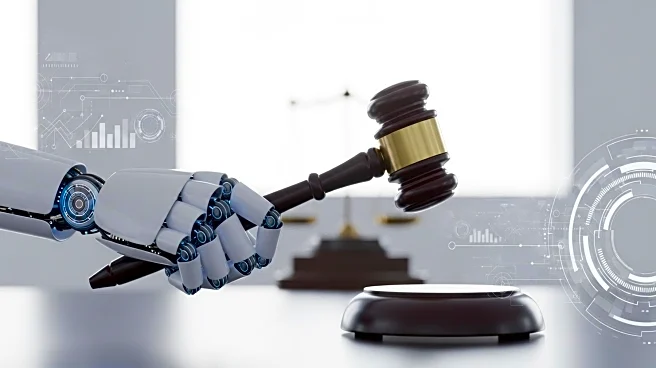What's Happening?
Personal injury lawyers are leading the way in adopting artificial intelligence (AI) within the legal profession. According to recent survey data, 37% of personal injury lawyers are utilizing generative AI in their work, compared to 31% of lawyers overall. Despite individual use, firmwide adoption remains limited, with only 19% of personal injury firms formally implementing AI. These firms are approaching AI adoption thoughtfully, preferring trusted legal software vendors that ensure compliance with ethical standards. AI is being used for tasks such as summarizing medical records, drafting documents, and marketing, with efficiency gains reported by nearly a third of respondents.
Why It's Important?
The adoption of AI by personal injury lawyers signifies a shift towards increased efficiency and productivity in the legal field. AI tools are helping lawyers manage high volumes of repetitive tasks, such as drafting and analyzing medical records, which are common in personal injury cases. This adoption could lead to cost savings and reduced reliance on outsourced work, positioning personal injury firms to benefit from AI's potential to streamline operations. The focus on ethical compliance and trusted vendors highlights the profession's cautious approach to integrating AI, ensuring that legal standards are maintained.
What's Next?
Looking ahead, personal injury firms are still determining their AI adoption timelines, with 62% unsure when or if they will adopt. However, 16% plan to adopt AI within the next year, and 8% within six months. Firms already using AI anticipate increased productivity, cost savings, and the replacement of some administrative functions. The expectation that AI will replace outsourced work is higher among personal injury firms than lawyers overall, indicating a potential shift in how these firms manage routine tasks.
Beyond the Headlines
The integration of AI in personal injury law practices could lead to broader changes in the legal industry, influencing how firms approach case management and client interactions. As AI tools become more sophisticated, they may offer new ways to analyze complex data, potentially transforming legal strategies and outcomes. The focus on ethical alignment and trusted vendors underscores the importance of maintaining professional standards while embracing technological advancements.










